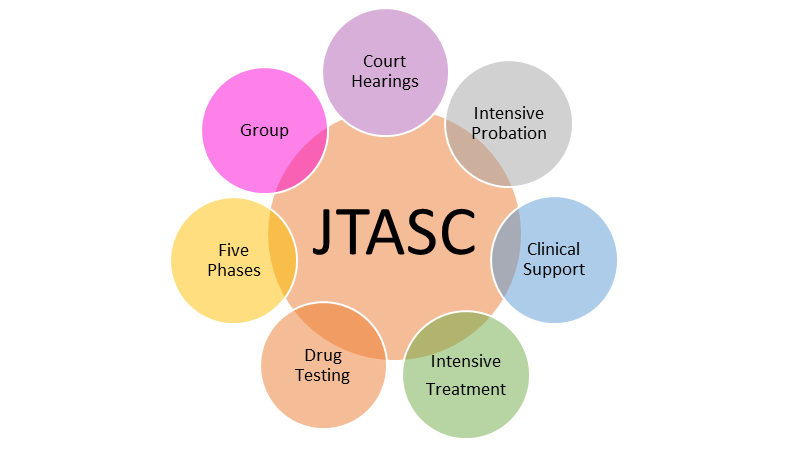Juvenile Treatment and Support Court (JTASC)
JTASC is a mental health court to improve the response of youth, with a severe emotional disturbance, who because of their emotional health challenges encounter the juvenile justice system.
Alternative to Residential Placement
Access to Treatment & Support Services
Enhanced Supervision and Monitoring
Compassionate Case Management
JTASC uses a Team Based Approach
The team is led by the Honorable Deborah McNabb and consists of a Court Coordinator, Prosecutor and Defense Counsel, a Probation Officer, a Clinician, and a Network of Community Mental Health Providers.
The Team works together for the common goal of helping youth improve their emotional health, school performance & general well-being, and to eliminate future engagement with the legal system.
Participation in JTASC is Voluntary
Youth/Parents sign a Participation Agreement to demonstrate their desire to participate in JTASC. Once admitted they will be accountable to the following requirements:
- Weekly JTASC Court Reviews
- Participation in treatment for the duration of the time they are in JTASC
- Regular drug testing
- Weekly supervision with their Probation Officer
- Compliance with all conditions ordered by the Judge
- Compliance with JTASC program rules
Length of Program
JTASC can be completed in as few as 9 months, but the pace is set by the youth and may take longer to complete.

Please download the referral form and then fill out in a PDF viewer, such as Adobe Acrobat or Adobe Reader
-
Directions for Participating in JTASC
Court Hearings/Reviews Using Zoom
Equipment
You will need a phone, tablet, or computer to participate. This is a standing hearing and you are expected to attend.
Participating
Use your phone, tablet or computer to participate virtually by video. YOU WILL NEED TO DOWNLOAD THE FREE ZOOM APP on your phone, tablet, or computer.
- You will receive an invitation that will have a URL (web address to put in the browser) or you will be able to click on the link if you have provided an e-mail address.
- You can be seen, you will see the judge and others at the hearing, and hear the proceedings.
- The first time you try to connect to a ZOOM hearing you will be prompted you through the steps to download the app. OR go to the app store and download ZOOM Cloud Meetings
Need Help?
Practice before the hearing and join the hearing early so we can start on time. If you haven’t use Zoom you can watch an easy video on You Tube called Joining a Zoom Call for the First Time; Fun and Easy Online Connecting
Still Need Help? Nikeidra Battle-DeBarge can practice with you before the meeting. Email them and let them know! They will send you an invite to a practice meeting.
During the Hearing/Review
- In the JTASC Youth and Family Handbook review the section on Court Etiquette including the additional expectations for participating in a virtual review.
- Please participate by video (click Join with Video) if you are participating on web app. Click on participate by Audio (Click Join with Computer Audio) to speak and to hear others.
- When you join you will be placed in a waiting room. You will be admitting into the review/hearing when the Judge is ready to begin. Don’t hang up!
- When you join the review/hearing everyone but the Judge will be muted. When it is your turn to talk with the Judge you will unmute your line.
- In the top right corner click on Gallery View. This will allow you to see everyone at the hearing as well as hear others attending the review/hearing speak.
- Having trouble during the hearing? Text or call Nikeidra or Lisa Holmes for assistance.
Target Population
Youth must meet both legal and mental health eligibility criteria. In addition, parent commitment and involvement is required.
- LEGAL ELIGIBILITY is a discretionary matter and determined on a case by case basis by the Kent County Prosecutor’s Office. Participation depends on the youth’s current charges and prior history with the court. However, youth with a past or current CSC, or violent crime that resulted in death or serious bodily harm, are NOT by law eligible to participate.
- SEVERE EMOTIONAL DISTURBANCE (SED) is the result of a diagnosable mental, behavioral, or emotional health disorder that impairs and limits a youth’s role or functioning in family, school, or community activities. Ongoing and intensive treatment is needed to improve the youth’s ability to function.
- PARENT INVOLVEMENT is critical and necessary for a youth to participate and be successful in JTASC. Youth must attend weekly court status reviews, meet weekly with their probation officer, and attend all mental health treatment appointments.
Make a Referral
Anyone can refer a youth for JTASC (i.e. law enforcement, detention staff, probation, attorneys, judge, clinician, parent or family member).
To Initiate a Referral
Complete section I of the JTASC referral form (Please download the form and then fill out in a PDF viewer, such as Adobe Acrobat or Adobe Reader). Section I can be obtained at the Juvenile Probation Office located @ 180 Ottawa NW, suite 305), on Access Kent Website, or by contacting the JTASC Coordinator, lisa.holmes@kentcountymi.gov
Referral Process Includes
- A review by the Kent County Prosecutor’s Office to determine if the youth meets legal eligibility requirements;
- A mental health screen conducted by a Clinician to determine if the participant meets mental health eligibility criteria; and
- A review by the full JTASC team to determine if the individual is appropriate for participation.
For More Information
Contact Lisa Holmes,JTASC Coordinator at 616-410-6857 or lisa.holmes@kentcountymi.gov.
